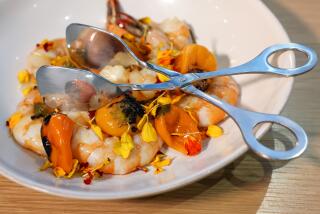Feast (Slowly) on the Buffet of Life
- Share via
One of the things weighing heaviest on our minds this time of year is our stomachs. So, here’s to the holiday feast, traditional recipes, bountiful platters and crowded kitchens, the common denominator for many of us this season.
To take a step back, but not so far off point, let’s consider that underappreciated creature, the snail. And also the first man to take the snail seriously, Italian Francesco Angelita. In a 1607 book, Angelita correctly suggested that humans might learn a thing or two from the snail.
Chiefly, he believed we should emulate the snail’s pace: to go slow in life and enjoy rather than run around “inconsiderate and foolish.” And like the snail, we should be at home in whatever situation we find ourselves.
Precisely 379 years later, with humankind still madly stomping its foot on the accelerator of progress, Angelita’s snail became the symbol of a spirited, wait-a-minute organization known as Slow Food. Yes, Slow Food is the counter-trend to fast food, but that is not quite saying enough. If fast food is about hurrying to the next item on the day’s rush agenda, Slow Food is the philosophy of savoring those essential things that bring us satisfaction in life, beginning with breakfast.
“We all end up in the same place anyway, so we might as well go there slowly,” said Carlo Petrini, the Italian journalist and gourmand who founded the international movement in 1986.
So, Slow Food is about eating well. And eating food that is worth savoring. And, of course, doing so slowly, so as to draw pleasure from it. The old wheeze, “We are what we eat,” is not just biochemistry. To the Slow Food manifesto you can add the generalized idea of relaxing along the path of life and thinking more about altruism, nature and the rituals of hospitality. Which also happens to be the center of gravity for many of us during this interval of holidays.
“Wouldn’t it be great to have Christmas meals, holiday meals, all through the year--to create that spirit each week, of food and family and friends, and not have to wait 12 months?” asks Patrick Martins, director of Slow Food USA.
That an idea so self-evident as Slow Food needs a membership organization, a Web site and a publishing subsidiary to remind us of basic pleasures is proof of just how much we overlook when we spend all our time racing to keep apace.
“It is a somewhat shattering moment when we realize that our lives are made up of the particulars of what we do every day,” observes novelist Jim Harrison, one of our most sportive food writers.
Slow Food has become, in part, a political movement--a defender of artisanal cheese and food producers as well as a champion of eco-gastronomy, or “doing good by eating.” For the moment, though, we can defer politics and consider more broadly the science that supports a reappraisal of our approach to food and life.
Evolutionary psychologists postulate that our smorgasbord of contemporary human neuroses rises from the unhuman pace of modern living. That is, humans evolved through genetic self-selection to meet certain circumstances, foremost keeping our bellies full.
For all but the recent eye blink of industrial history, the task of providing dinner preoccupied the time and thoughts of our progenitors and surely grew to be a chief source of their pleasures. Food was not just fuel; food was the meaning of life. These habits and traits, we presume, were threaded into the coils of DNA passed down to us.
If you accept this hypothesis--and for heaven’s sake, why not?--then a No. 1 drive-through value meal with large fries is unlikely to fulfill our inherited yearning to celebrate dinner as the triumph of the day. Without realizing it, we are left untethered from ourselves. Hence, ever more daffy.
This time of year, at least for the lucky, draws us back to the heartbeat of our primordial rituals: the production of the feast with family and friends, and the reward of resting afterward, snail-like and content. We are renewed. We reacquaint ourselves with the nature of human nature. It is a gift from the holiday season to us.
More to Read
Eat your way across L.A.
Get our weekly Tasting Notes newsletter for reviews, news and more.
You may occasionally receive promotional content from the Los Angeles Times.










